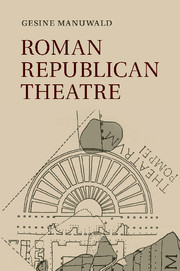Introduction: previous scholarship and present approach
Published online by Cambridge University Press: 05 July 2011
Summary
Roman drama was one of the earliest literary genres to be established in Rome, emerging against the background of Rome's contact with other cultures and its rise to being a major power in the Mediterranean. Thus the history of early Roman drama is not only of literary interest, but also of political, social and cultural relevance: for instance, the introduction of dramatic performances changed the set-up of public festivals with their specific religious rituals and their role within the political community; theatrical events gained relevance as a public institution. Within this framework a variety of dramatic forms were developed over time, which were shaped by individual playwrights according to their different styles and their respective historical situations. From the late Republican period onwards scholars started to discuss questions of dramatic history and terminology as issues in their own right.
Despite the inherent importance of this literary genre and its early reception, modern research into Roman Republican drama is confronted by the difficulty that evidence is scarce, since a large part of Rome's dramatic literature has not survived. Names of playwrights, titles of plays, testimonia and fragments from a limited number of pieces are all that remains for some periods and/or dramatic genres. The only dramas preserved in their entirety are the comedies of Plautus and Terence from the Republican period as well as the tragedies of Seneca the Younger (including a possibly spurious one) and the anonymous praetexta Octavia (transmitted in the Senecan corpus) from the imperial era.
- Type
- Chapter
- Information
- Roman Republican Theatre , pp. 1 - 12Publisher: Cambridge University PressPrint publication year: 2011



